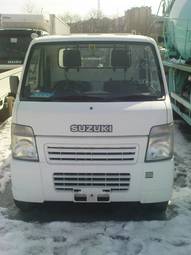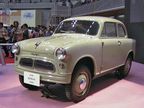2003 Suzuki Carry Truck
Photo #1 - Enlarge photo 640x853

Photo Information (Width: 191px, Height: 255px, Size: 8Kb)
Suzuki Carry Truck Problems
Ingine warning indacator turns on
2006, the warning ingine turn on, wat is the
problem 4 dat and the ingine turn of anytime...
| Engine size - Displacement - Engine capacity: | 660 cm3 |
| Transmission Gearbox - Number of speeds: | Manual |
| Fuel Type: | Gasoline |
| Drive wheels - Traction - Drivetrain: | FR or RR |
| Price (out of date): | $5200 |
2003 Suzuki Carry Truck specs, Engine size 0.7l., Fuel type Gasoline, Drive wheels FR or RR, Transmission Gearbox Manual
|
"Suzuki" is pronounced in Japanese as "soo-zoo-kee" / suzuki/ , with emphasis on a high "kee". It is almost always pronounced in English as "suh-ZOO-kee" / səˈzuːki/ , with a stressed "zoo". This pronunciation is used by the English-speaking public and by the Suzuki company in marketing campaigns directed towards this demographic. In 1909, Michio Suzuki founded the Suzuki Loom Company in the small seacoast village of Hamamatsu, Japan. Business boomed as Suzuki built weaving looms for Japan's giant silk industry. In 1929, Michio Suzuki invented a new type of weaving machine, which was exported overseas. Suzuki filed as many as 120 patents and utility model rights. The company's first 30 years focused on the development and production of these exceptionally complex machines. Despite the success of his looms, Suzuki realized his company had to diversify and he began to look at other products. Based on consumer demand, he decided that building a small car would be the most practical new venture. The project began in 1937, and within two years Suzuki had completed several compact prototype cars. These first Suzuki motor vehicles were powered by a then-innovative, liquid-cooled, four-stroke, four-cylinder engine. It featured a cast aluminum crankcase and gearbox and generated 13horsepower (9.7kW) from a displacement of less than 800cc. » Read More About Suzuki |



